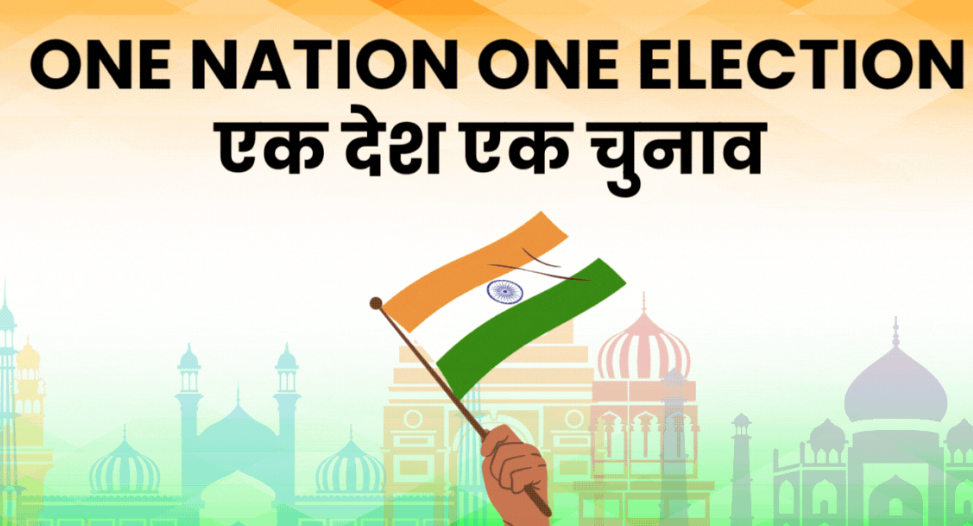The looming threat to federalism and democratic tenets
Syllabus:
GS 2: Functions and responsibilities of the Union and the States
Why in the News?
The ruling government, led by the Bharatiya Janata Party/National Democratic Alliance (BJP/NDA), is seriously pursuing the One Nation, One Election (ONOE) framework.
Introduction
- ONOE aims to synchronise Lok Sabha and State Assembly elections into a single electoral cycle.
- Proponents of ONOE highlight administrative and fiscal efficiencies as key benefits of this proposal.
- Critics argue that ONOE could have far-reaching implications on India’s democratic and federalist character, as enshrined in the Constitution of India.
- Concerns have been raised about ONOE potentially leading to the centralisation of powers and neglecting issues such as the need to strengthen anti-defection laws.
- Historical Context of Simultaneous Elections
Initial Practice of Simultaneous Elections
- In the early years post-Independence, the Election Commission of India (ECI) conducted simultaneous elections for both Parliament and State Assemblies.
- This cycle was disrupted due to the invocation of Article 356 (President’s Rule), which undermined cooperative federalism.
Misuse of Article 356
- First invoked in Kerala in 1959, it marked the beginning of federal overreach, as the Union’s will override State autonomy.
- B.R. Ambedkar referred to Article 356 as a “dead letter”, meant for rare use, but its misuse became widespread.
- Successive governments dismissed over 130 State governments under Article 356 between 1950 and 1994.
- Despite the R. Bommai judgment (1994) restricting its arbitrary use, incidents of misuse continue.
Defections and the Anti-Defection Law
- Defections destabilized State governments, with legislators switching sides for personal or political gain.
- The Anti-Defection Law (52nd Amendment Act, 1985) under the Tenth Schedule aimed to disqualify defectors.
- However, loopholes, such as the absence of a time-bound framework for Speakers to decide disqualification petitions and provisions for “group defections,” have rendered the law ineffective.
Challenges with ONOE
- ONOE proposes aligning State election cycles with the Lok Sabha, requiring constitutional amendments to Articles 83 and 172, which guarantee five-year terms for Parliament and State Assemblies.
- The proposal risks further misuse of Article 356 and fails to address the inadequacies in anti-defection laws.
- State governments may face curtailed or extended terms, undermining their autonomy.
- This reduction in autonomy constitutes an attack on the federalist structure of the Constitution, going beyond administrative concerns.
Federal Structure Under Siege
Impact on the Federal System
- India’s federal system allows States to function independently, addressing local issues effectively.
- Simultaneous State and national elections under ONOE could impair voters’ ability to evaluate the State government’s performance
Challenges to the Democratic Principle
- ONOE may result in abbreviated tenures for State governments, violating the democratic principle of “one person, one vote, one value.”
- In case of midterm elections, new governments may serve only the remaining time in the synchronised cycle, cutting short full tenures.
Historical Examples
- Political instability in the 1990s saw multiple Lok Sabha elections in 1996, 1998, and 1999.
- If ONOE had been enforced then, another election in 2001 would have been necessary, increasing electoral frequency.
Governance Concerns
- Frequent or shortened tenures reduce governments’ ability to:
- Analyze socio-political and economic conditions.
- Frame and implement effective policies.
Conduct course corrections
- ONOE could lead to governance disruption outweighing the usual policy paralysis caused by the Model Code of Conduct during elections.
Logistical Challenges
- India’s electorate of over 900 million voters requires immense resources for elections.
- Aligning Lok Sabha, State, and local body elections would:
- Increase the burden on the Election Commission of India (ECI) and security forces.
- Risk voter fatigue and confusion, affecting turnout and informed decision-making.
Financial and Administrative Costs
- Although ONOE is touted to enhance efficiency, the logistical and financial costs could overshadow the anticipated benefits.
Address the Issues First
Reflection Before Implementation
- The ONOE framework, despite its potential fiscal and administrative efficiencies, requires thorough reflection to address systemic issues affecting State governments.
Key Issues to Address
- Misuse of Article 356: Preventing federal overreach and ensuring its use aligns with constitutional intent.
- Strengthening Anti-Defection Laws: Closing loopholes to prevent defections that destabilize governments.
- Stability of State Governments: Creating mechanisms to ensure their resilience and autonomy.
Safeguarding Federalism
- The federal structure is not merely procedural but a recognition of India’s diversity and plurality.
- Forcing States to align with a unified electoral cycle undermines their autonomy and dilutes the democratic essence of governance.
Risks of a Hurried Implementation
- Imposing ONOE without systemic reforms could be a frontal attack on the Constitution’s basic structure.
- Instead of enhancing democracy, it could exacerbate existing vulnerabilities and become a blot on Indian democracy.
Lessons from Institutional Failures
- Incidents like the Jammu and Kashmir government’s dismissal due to a malfunctioning fax machine highlight the frailty and opacity in institutional processes.
- Systemic reforms are necessary to ensure accountability to constitutional principles.
Commitment to Federalism
- True democratic governance requires more than simultaneous elections.
- It demands a commitment to federalism, strengthening State governments as equal partners in the federal structure.
- ONOE must not centralize power but instead promote the spirit of cooperative governance.
Source: The Hindu
Mains Practice Question:
Discuss the feasibility and implications of implementing the One Nation, One Election framework in India, with a focus on federalism, democratic principles, and systemic reforms. (250 words)




